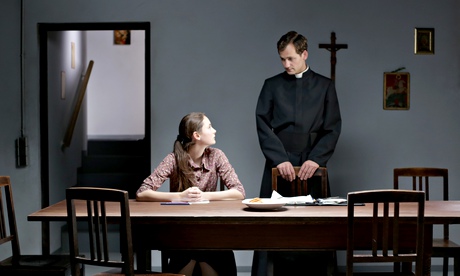
This chillingly austere tale of a young woman driven toward self-destruction by an oppressively stringent religious upbringing offers a piercing examination of the interplay between fundamental dogma and family dysfunction, spiritual sacrifice and societal self-harm. Presented with ritual formality as a series of static camera tableaux chaptered according to the Stations of the Cross, this boasts a defining aesthetic as rigidly constrained as the orthodoxies it portrays. Yet within the theatrical space of its extended takes, the cast find space to live and breathe with a naturalism that packs a hefty emotional punch.
Crucially, although the film invites us to view the wasting torments of its heroine as a form of institutionalised child abuse, German co-writer Anna Brüggemann and her director brother, Dietrich, are careful not to be doctrinal. Those wishing to find perverse evidence of transcendence will not be thwarted – like Lars von Trier’s Breaking the Waves (a movie I detest), Stations of the Cross appears to acknowledge the miraculous, even as it descends into hell on Earth.
We first meet 14-year-old Maria (Lea van Acken) with a group of young people preparing for confirmation in a southern German town. Their church belongs to the fictitious Society of St Paul that rejects the liberalisations of the second Vatican council, cleaving to the Latin mass, fearing the vulgar tongues of devious devils who now walk among us. An advocate of “opportunities for sacrifice”, Father Weber (Florian Stetter) is young, engaging and impassioned, but his instructions are harsh and unforgiving, chiding his charges for not challenging their schoolmates on the subject of satanic music, invoking the spectre of “holy children” called to God at a tender age, demanding that his flock similarly become soldiers of Jesus.
Back at home, Maria is constantly harangued by a troubled mother (Franziska Weisz) who sees nothing but wickedness in her daughter’s maturing personality; the ghost of Carrie White seems to sit at their family table as Maria guiltily confesses that a young boy has asked her to sing in a choir that performs “mainly Bach, but also gospel and soul”. Outcast at school, isolated at home and determined to offer her life to God in return for the improved health of her mute four-year-old brother, Maria resolves to take her elders at their word, to punish the flesh in pursuit of the soul, with paroxysmal results.
Like the angels (and demons) which legendarily attend the sick and the dying, a number of movies float like spectral apparitions around Stations of the Cross. Although comparisons with Carl Dreyer seem apposite (and Bruno Dumont’s 2009 Hadewijch makes an intriguing companion piece), I was more acutely reminded of the heart-breaking horrors of Hans-Christian Schmid’s 2006 Requiem, which presented a bleak portrait of a young woman whose conflicted faith leads her to believe that she is possessed by demons. As with its gaudy Hollywood counterpart The Exorcism of Emily Rose, Schmid’s movie was inspired by the real-life case of the “possessed” Anneliese Michel, a tragic figure whose long shadow stretches (via the remote Romanian wilds of Cristian Mungiu’s comparable Beyond the Hills) across this similarly unsettling yet deeply compassionate piece.
Here we find the strong, intelligent Maria struggling to reconcile her growing independence with a religion that sanctifies martyrdom and celebrates self-abnegation. That she does so in a world in which the judgment and objectification of teenage girls has caused a toxic outbreak of eating disorders (a tempting cookie presents “a potential sacrifice”) merely universalises this astutely observed crisis. In her film debut, Lea van Acken is utterly convincing as the withering teen seeking the cherished approval of her church and mother – if not in this world, then the next. There’s something of Agata Trzebuchowska’s novitiate from Pawel Pawlikowski’s Ida in Van Acken’s blankly beatific demeanour; the iconic gaze, staring beyond the surface, a statue made flesh, inscrutable yet wholly engaging.
How one reads Stations of the Cross is ultimately a matter of personal conscience. The Brüggemann siblings, who have first-hand family experience of the Society of Saint Pius X (the model for the film’s Society of St Paul), have spoken of “the global resurgence of radical practitioners of faith” – Catholic, Baptist, Muslim et al – and asked explicitly: “How can a teenage girl face the world when she’s learned to mistrust it?” If there is abuse in their story, it is not of the headline-grabbing variety that has beset the Catholic church of late, but a more insidiously far-reaching brand of existential neglect that places ideology above parental love, with demonic results.
“I’m telling you that thing upstairs is not my daughter,” says Chris MacNeil in The Exorcist, a film that offered a reassuringly archaic portrait of good and evil during a time of secular uncertainty and strife. Here, that template is turned upon its head, the holy ghost (rather than the demon Pazuzu) wafting its unhealing wings over the body of a child, leaving adults to squabble about the definition of deity and audiences to decide whether or not they hear the voice of God.

